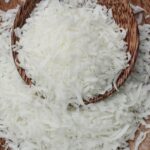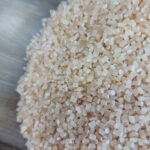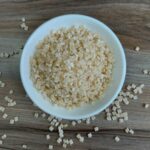CASHEW NUT SHELL OIL
In the world of food manufacturing, especially in the production of meat products, maintaining consistent quality and texture is crucial. As consumer demands for high-quality, shelf-stable, and cost-effective products continue to rise, manufacturers are turning to innovative ingredients to meet these expectations. One such ingredient is modified tapioca starch, which has gained significant popularity in the meat industry for its unique functional properties. In this blog, we’ll explore five key ways modified tapioca starch enhances the texture of meat products, helping manufacturers deliver superior products to the market.

Table of Contents
Toggle1. Improving Moisture Retention
Moisture retention is a critical factor in ensuring that meat products remain juicy and appealing throughout their shelf life. Modified tapioca starch plays a vital role in this aspect by effectively binding water within the product. This binding capability helps prevent moisture loss during cooking and storage, resulting in meat products that maintain their succulent texture for longer periods. This is especially important in products like sausages, meatballs, and deli meats, where moisture loss can significantly impact the eating experience.
2. Enhancing Gelation and Firmness
The texture of meat products is heavily influenced by their firmness and gelation properties. Modified tapioca starch excels in enhancing these characteristics, providing the desired firmness that consumers expect in products like hams, chicken nuggets, and processed meats. By forming a stable gel matrix, modified tapioca starch ensures that the meat products have a consistent and desirable texture. This gelation process not only improves the mouthfeel but also contributes to the overall structure and integrity of the product, making it easier to slice, chew, and enjoy.
3. Improving Freeze-Thaw Stability
One of the challenges faced by manufacturers of frozen meat products is maintaining texture after repeated freeze-thaw cycles. Traditional starches can break down during these cycles, leading to a loss of texture and quality. However, modified tapioca starch is engineered to withstand the rigors of freezing and thawing without compromising the texture of the product. It helps in maintaining the structural integrity of meat products, ensuring that they remain firm, cohesive, and visually appealing even after being frozen and thawed multiple times.
4. Enhancing Emulsification and Binding
In meat products, the emulsification and binding of ingredients are crucial for maintaining a uniform texture and preventing separation of fat and water. Modified tapioca starch has excellent emulsifying properties, which help in creating a stable blend of ingredients, leading to a consistent texture throughout the product. This is particularly important in processed meats, such as sausages and pâtés, where a smooth, homogenous texture is a key quality attribute. The starch acts as a binder, holding the ingredients together and preventing the release of fat and moisture during cooking, which could otherwise lead to a dry and crumbly product.
5. Reducing Fat Content While Maintaining Texture
As consumers become more health-conscious, there is a growing demand for meat products with reduced fat content. However, reducing fat can often lead to a less desirable texture, as fat contributes to the juiciness and mouthfeel of the product. Modified tapioca starch offers a solution by mimicking the mouthfeel of fat, allowing manufacturers to reduce the fat content without sacrificing texture. This starch creates a creamy, rich texture that compensates for the reduced fat, making it possible to produce healthier meat products that still deliver the satisfying texture consumers expect.

Conclusion
Incorporating modified tapioca starch into meat products provides a multitude of benefits, particularly in enhancing texture. From improving moisture retention and freeze-thaw stability to enhancing emulsification and reducing fat content, this versatile ingredient helps manufacturers meet consumer demands for high-quality, consistent, and appealing meat products. As the market continues to evolve, the use of modified tapioca starch will likely become even more widespread, solidifying its role as a key ingredient in the production of superior meat products.
If you are looking for optimal solutions involving modified tapioca starch, please contact Abimex Group.












